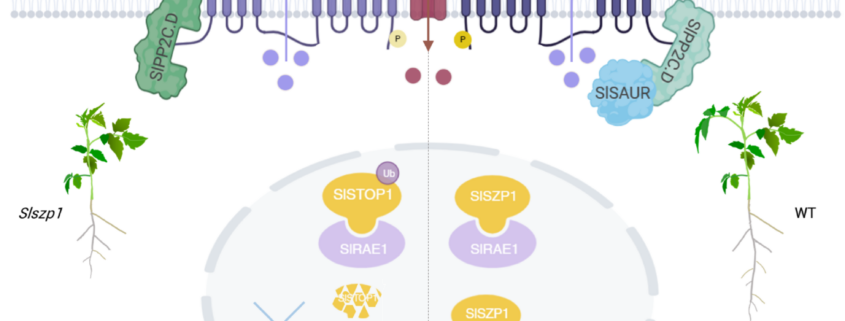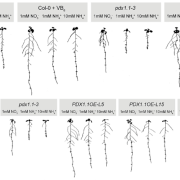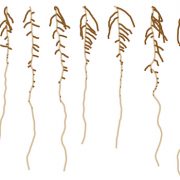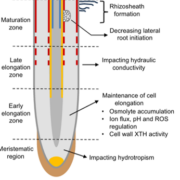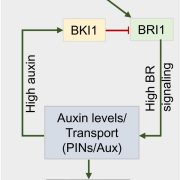Tomato SAURs regulate root elongation under Al stress
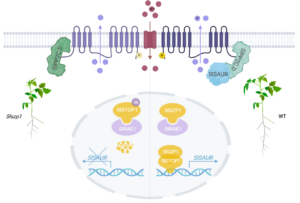 In acidic soils, aluminum (Al) toxicity is a major problem that causes a dramatic arrest in root elongation. Aluminum tolerance can include the secretion of organic acids and the sequestration of Al in internal cellular compartments. Here, Dong et. al shed light on a new pathway that alleviates the inhibition of cell elongation in the presence of Al. Previous studies have highlighted the importance of the plasma-membrane-localized H+-ATPase in Al tolerance. For example, in cucumber, Al decreases the activity of the PM H+-ATPase, whereas in tomato its activity is increased in the presence of Al. In rice, inhibition of the PM H+-ATPase lowers the Al uptake through specific channels, and in Arabidopsis increased PM H+-ATPase activity increases the secretion of organic acids. Previously, a rice mutant was identified, sal1 (sensitive to aluminum 1) that is hypersensitive to aluminum. SAL1 encodes a plasma-membrane localized PP2C.D-type protein phosphatase that interacts with and suppresses the activity of the plasma-membrane-localized H+-ATPase. Previously also, STOP1 was shown to be a transcription factor that is upregulated in the presence of Al and enhances Al tolerance. Here, Dong et al. identified two genes that are transcriptional targets of tomato STOP1 (SlSTOP1) that encode small-auxin upregulated proteins, SlSAUR36 and SlSAUR38. These proteins interact with protein phosphatase SlPP2C.D, lowering its inhibition of PM H+-ATPases and promoting cell expansion in the presence of Al. These insights could contribute to the development of enhanced tolerance to aluminum in tomato and other crops. (Summary by Mary Williams @PlantTeaching) Plant Physiol. 10.1093/plphys/kiae519
In acidic soils, aluminum (Al) toxicity is a major problem that causes a dramatic arrest in root elongation. Aluminum tolerance can include the secretion of organic acids and the sequestration of Al in internal cellular compartments. Here, Dong et. al shed light on a new pathway that alleviates the inhibition of cell elongation in the presence of Al. Previous studies have highlighted the importance of the plasma-membrane-localized H+-ATPase in Al tolerance. For example, in cucumber, Al decreases the activity of the PM H+-ATPase, whereas in tomato its activity is increased in the presence of Al. In rice, inhibition of the PM H+-ATPase lowers the Al uptake through specific channels, and in Arabidopsis increased PM H+-ATPase activity increases the secretion of organic acids. Previously, a rice mutant was identified, sal1 (sensitive to aluminum 1) that is hypersensitive to aluminum. SAL1 encodes a plasma-membrane localized PP2C.D-type protein phosphatase that interacts with and suppresses the activity of the plasma-membrane-localized H+-ATPase. Previously also, STOP1 was shown to be a transcription factor that is upregulated in the presence of Al and enhances Al tolerance. Here, Dong et al. identified two genes that are transcriptional targets of tomato STOP1 (SlSTOP1) that encode small-auxin upregulated proteins, SlSAUR36 and SlSAUR38. These proteins interact with protein phosphatase SlPP2C.D, lowering its inhibition of PM H+-ATPases and promoting cell expansion in the presence of Al. These insights could contribute to the development of enhanced tolerance to aluminum in tomato and other crops. (Summary by Mary Williams @PlantTeaching) Plant Physiol. 10.1093/plphys/kiae519


